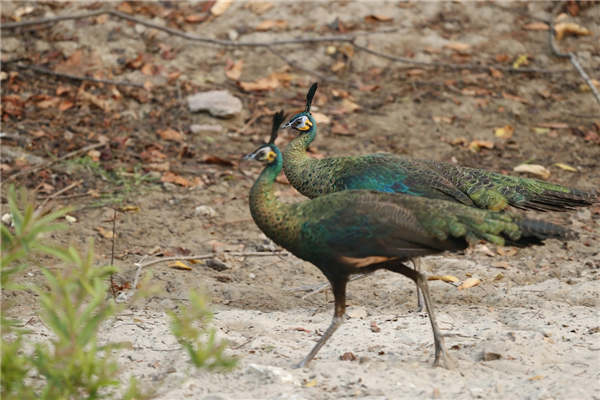Last stand of the great green peacock


As building continues, riverside trees will be felled and roads built, and that will irreversibly damage the local ecosystem, Gu says. If the water level rises as planned, an area of more than 40 km of low-lying valley along the Xiaojiang and Luzhi rivers, two branches of the Honghe River, are likely to be damaged.
"That means the best parts of the valley habitat for green peacocks will be submerged."
Many valuable and rare plants in the forests, including hundreds of cycads, would also be affected, he says.
Realizing the urgency of the situation Gu decided to make a public plea for the green peacock and its habitat to be protected, and he put information online, drawing a wide response.
Several wildlife organizations and experts in various fields, such as Xi Zhinong, a wildlife photographer, joined the effort. Even a local rafting team volunteered to send experts to carry out scientific research in the highly inaccessible valley area.
In March last year three wildlife groups sent an urgent letter to the Ministry of Environmental Protection proposing suspension of the hydropower project in the river basin to save the green peacocks' habitat.
Soon the Yunnan provincial office of the State Administration of Forestry opened an investigation on how construction of the hydropower station would affect the green peacocks and their habitat and promised it would call on local governments and departments urgently to take measures to protect the species' habitat.
In July last year Friends of Nature, one of the oldest nationwide environmental organizations in China, initiated a public interest lawsuit against the hydro project operator, aiming to terminate the project because of its effect on the environment.
The next month the lawsuit was formally filed in Chuxiong Yi autonomous prefecture in Yunnan, making it the first preventive public interest lawsuit for wildlife protection filed in China. It is now a cause celebre, one of the earliest cases of environmental groups taking legal action to protect important wildlife and their habitats, says Ge Feng, a lawyer involved in the case.
"Preventive public interest litigation is very significant socially. If we can stop the violation before the damage is done, we can reduce the costs to society," Ge says.
Joint efforts have brought positive results, he says.
Construction of the hydro project has been on hold for a little more than a year now, and the provincial government has listed the green peacock as a critically endangered species and included the entire habitat area in a red zone, ensuring better protection.
"It's a very good example of people from various backgrounds working together to protect a valuable species and its habitats," Gu says.
"Each organization and individual has played a role," Gu says.




































